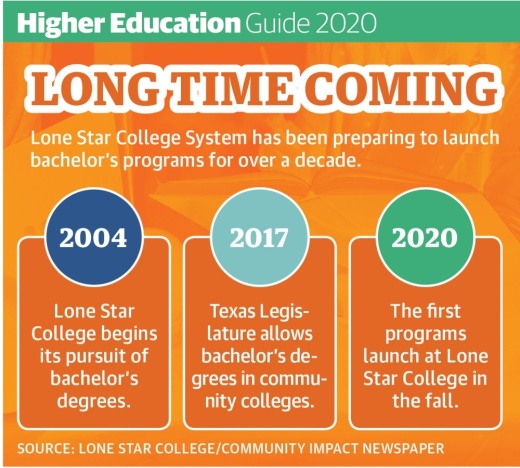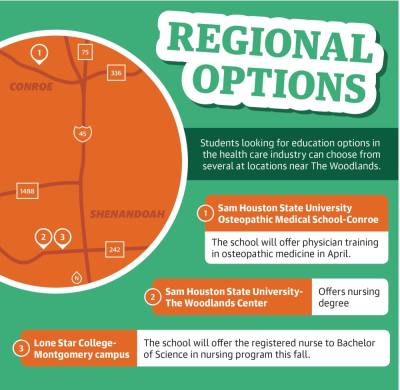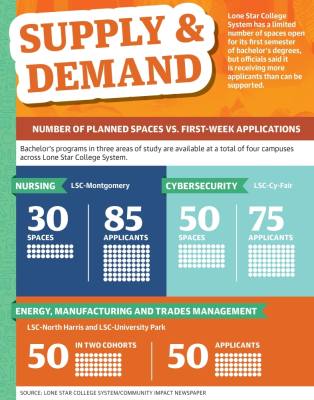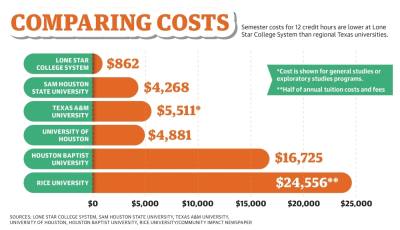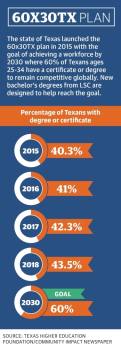This fall, area registered nurses will be able to obtain bachelor’s degrees at Lone Star College-Montgomery following the passage of Senate Bill 2118 by the Texas Legislature in 2017 and approval from the Texas Higher Education Coordinating Board.
Among those excited about the nursing program is Kerrie Guerrero, the chief nursing officer and vice president of Houston Methodist The Woodlands Hospital. Guerrero said around 14%, or 50, of the nurses at the hospital are working toward or could benefit from obtaining a bachelor’s degree.
“We want to constantly provide professional development opportunities for our staff,” Guerrero said. “The Lone Star program does that. It is close to home. ... This is an incredible opportunity for nurses across Montgomery County and especially in The Woodlands.”
The new nursing program at the Montgomery campus is one of three approved by the THECB for Lone Star College System. Other degrees are the Bachelor of Applied Technology in cybersecurity at the Cy-Fair campus and the Bachelor of Applied Science in energy, manufacturing and trades management at the North Harris and University Park campuses, according to Valerie Jones, associate vice chancellor of academic affairs.
An immediate effect
Jones said within the first week of accepting applicants for the new programs, there were 85 applicants for the nursing program, which is capped at 30 students.
“We encourage students to continue to apply because we want to make sure to serve as many students as possible,” Jones said.
Catherine Giegerich, vice president and chief nursing officer of Memorial Hermann Woodlands Medical Center, said while she was unaware if any of Memorial Hermann’s employees had signed up for LSCS’ nursing program, it could potentially affect 20% of the center’s workforce since the Institute of Medicine announced the Bachelor of Science in nursing would be the entry level for nursing positions.
“Memorial Hermann of The Woodlands stopped hiring associate’s degree nurses,” Giegerich said. “This greatly limited the number of staff that we hired from Lone Star. ... We can once again begin more fully supporting our local community academic partners by hiring their graduates. This will enable many of our local students to be hired by local employers.”
Guerrero also noted many hospitals in the area are growing, and the increased demand will require additional trained professionals.
At the Feb. 21 annual Economic Outlook Conference held in The Woodlands, it was reported health care jobs now make up 26% of The Woodlands area’s nonretail jobs, consisting of more than 10,000 jobs and overtaking the energy industry as the primary employment field for the area. Both Memorial Hermann and Houston Methodist announced expansions in 2019, adding a combined total of 744,000 square feet to the medical centers.
“There was a 2016 report from the Texas Center of Nursing Studies that there is going to be a 60,000-nurse shortage by 2030 if we continue at our current rate,” Guerrero said. “To become a nurse, education is intensive, and to produce nurses out of our nursing schools, it demands a lot of clinical sites.”
Guerrero said the LSCS program will help hospitals such as Houston Methodist The Woodlands achieve and maintain Magnet status from the American Nursing Credentialing Center. The status is an award that indicates a hospital’s strength and quality of its nurses, according to the ANCC.
Among the requirements for the designation is providing professional development opportunities for employees and showing the BSN rate is increasing year over year.
Registered nurses can now get a BSN degree at LSC-Montgomery within 12 months, Guerrero said.
“Lone Star has done an amazing job putting the program together so they can balance life and continue their education,” Guerrero said. “The classes are in the evening, so they can still go to school. That’s a huge benefit. They do not have to travel to the medical centers; they do not have to take time off of work. It is a benefit to all of the hospitals in the area.”
Affordability
A major draw for attending the three new programs is the overall affordability of attending a community college compared to a traditional four-year university, LSCS Chancellor Steve Head said.
“If you went to a four-year school with tuition, fees, books and the cost of living at universities, you’re probably going to spend $60,000 on an education,” Head said. “The tuition [for the bachelor’s program] is the same as it is for the community college, which means that you’ll be able to get a four-year degree for less than $20,000.”
Information from LSCS states students living within the college’s service area would pay $862 in tuition and fees for 12 credit hours per semester. Public universities, such as Sam Houston State University, University of Houston and Texas A&M, cost at least $4,200 per semester, according to information from the universities.
Jones said the legislative cycle that approved the programs also required the bachelor’s programs to align with the community college tuition rate. The lower rates help more students achieve an education while maintaining a flexible schedule, Jones said.
“You begin to process the full package of what it means to structure higher education around the needs of what may otherwise have been a nontraditional student or a student who had every capacity to excel in education and be a phenomenal student with a bachelor’s degree on track to reaching their dreams,” Jones said.
Head said funding for the programs is coming out of LSCS’ regular budget. An unspecified amount of money has been set aside in the budget for years to prepare for it, Head said, and the facilities are in place to support the new degrees. A total of $300 million of a $485 million bond passed in 2014 is going into workforce facilities, including an oil and gas training center at LSC-Tomball for degrees such as petroleum service technician and an LSC-Cy-Fair technology center that will support information systems and other technology programs, according to information from LSCS.
“We’re trying to fill a niche that hasn’t been met, so I think in the long term what’s going to happen is we’re going to help keep people here,” Head said.
Long-term thinking
According to Head, the college began its pursuit of bachelor’s programs around 2004. At the time, Head said universities were questioning whether community colleges should be offering four-year degrees.
Regular conversations at LSCS were held until the 2017 Texas Legislature, which authorized community colleges to offer up to three bachelor’s programs in applied technologies or nursing, Head said. From there, the college system had to work with the THECB, which gave the final approval.
Since the 2017 Legislature, the THECB has approved 21 new programs, including the three from LSCS. Of the institutions approved, 18 are at community colleges.
“I think it’s important for students to have the availability of programs that are low cost in the community, and I really think it’s a benefit to the whole state, especially to the student,” said Stacey Silverman, a commissioner with the THECB.
Head said LSCS plans to look into expanding the bachelor’s degrees programs, ensuring the nursing program gets off to a good start in Montgomery County before expanding it west. The cybersecurity and applied science programs will likely remain where they are due to the expense of building new centers, he said.
The new programs align with Gov. Greg Abbot’s 60x30TX plan, which states that by 2030, 60% of Texans ages 25-34 will need a certificate or degree for the state to be competitive globally. The plan was adopted in 2015 and as of a July 2019 report, 43.5% of Texans had reached that goal.
Head added LSCS plans to work with its university partners at the university centers in The Woodlands and University Park.
“If they are offering the program, we’re not going to offer it,” Head said. “We’re not competing with them; we’re partnering with them.”
Danica Smithwick contributed to this report.




